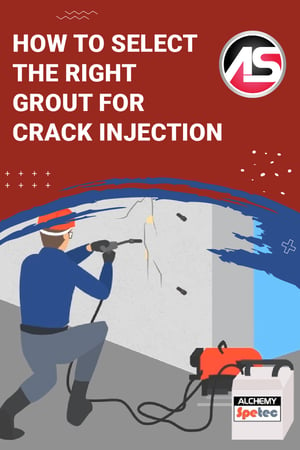
 Concrete is the most common building material in the world. While it has high compressive strength, it does not have much tensile strength. It is only since about 1910 that rebar has been specified. Reinforced concrete can and does still crack. So does that matter? Yes, most of the time it does matter.
Concrete is the most common building material in the world. While it has high compressive strength, it does not have much tensile strength. It is only since about 1910 that rebar has been specified. Reinforced concrete can and does still crack. So does that matter? Yes, most of the time it does matter.
Epoxies Are for Structural Repair
Epoxies are commonly and very effectively employed to “weld” these cracks back together. End of story, right? Of course not. For structural repairs epoxies are correct and necessary, but what about non-structural dynamic cracking? Well first off, why do we even care if there is a non-structural crack? Sometimes we don’t, but when this non-structural crack is the source of water intrusion action is required!
Water intrusion, besides being unsightly can cause many problems. Slip hazards are an obvious one, remember that rebar we started adding back in the 1910s? It can corrode, per NACE it can expand about 7-8 times its size, causing spalling and even complete failure of the concrete. Epoxy repair of a dynamic non-structural crack does not end well. The crack is there to relieve stress and if it is welded together with epoxy then it cannot move to relieve the stress, which causes what we call mirror cracking (this is a new crack in proximity to the previous epoxy repaired crack). Now we are back to where we started and we wasted time, labor, and materials on a failed repair.
Polyurethanes Are Ideal for Sealing Leaks
Flexible polyurethane grouts are ideal for dynamic cracks. They will waterproof the crack but still allow the cyclic movement - thus no mirror cracking, no leaks, and no corroding rebar. There are two main categories of polyurethane grouts, hydrophilic and hydrophobic. Hydrophilic grouts have more flexibility (higher tensile strength) and better adhesion than hydrophobic grouts. So, the answer seems clear, choose a hydrophilic grout. Hydrophilic grouts are the first choice for most below-grade applications, but since they form an open crosslinking when they polymerize, they can dry out in arid environments. Hydrophobic grouts have a closed crosslink and therefore are unaffected by wet-dry cycling, but have less elongation and lower adhesion strength. So, if you're new to this, it's best to consult an expert when selecting a polyurethane for your leak seal job.
Technical Support for Leak Seal Contractors
When it comes to waterproofing with chemical grouts, product selection and application techniques will make or break a job. Good technical support ensures more production and less product waste. I have over two decades of field experience. I'm happy to share that knowledge in support of all your waterproofing needs, and I am just part of the most experienced grouting tech service team out there. We pride ourselves on education and training in the field, in the classroom, and online. Please let us know how Alchemy-Spetec can be of assistance to you. Call our tech support team today at 404-618-0438.


